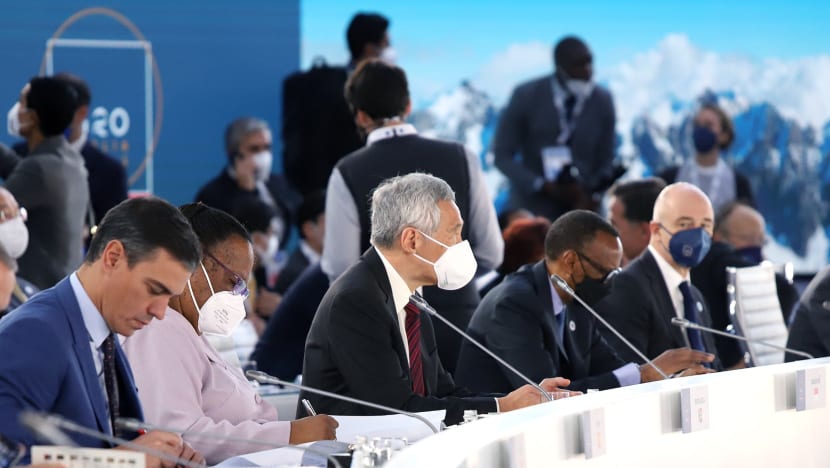Need for stronger international collaboration amid climate crisis, says PM Lee at G20 summit

PM Lee Hsien Loong attends the opening plenary session of the G20 Summit in Rome on Saturday (Oct 31). (Photo: Ministry of Communications and Information)
SINGAPORE: There is a need for stronger international collaboration as well as the scaling up of sustainable finance amid the climate crisis, said Singapore Prime Minister Lee Hsien Loong on Sunday (Oct 31) at the Group of 20 (G20) summit.
Speaking at the “Climate change and the environment” session on the second day of the summit in Rome, Mr Lee said that even in the midst of the COVID-19 pandemic, the climate crisis remains the “existential challenge of our times”.
“The latest IPCC (Intergovernmental Panel on Climate Change) report is sobering,” he added.
“It is timely that COP26 begins today. Whether from heat waves, rising sea-levels, heavier rainfall or flooding – as a small island state, Singapore is vulnerable,” he said.
The annual United Nations Climate Change Conference, known as COP26 this year, will begin on Sunday evening in Glasgow, Scotland.
For one, there needs to be stronger international collaboration on sustainability initiatives, Mr Lee noted.
Singapore, for instance, is working to establish regional power grids with its neighbours in the form of the Lao PDR-Thailand-Malaysia-Singapore Power Integration Project, he said.
“There is much scope to unlock the large and mutually beneficial economic opportunities as we push for decarbonisation and sustainability,” he said.
“Internationally, we must also continue working together. To address challenges in carbon credit markets around the world, improve their environmental integrity and scale up green opportunities and to manage potential cross-border spillovers of carbon pricing and related measures taken by individual countries," he added.
In addition, there is a need to scale up sustainable finance, Mr Lee said.
“It will become increasingly crucial for Asia and many other emerging economies to unlock private financing. To this end, we need to implement a consistent set of global standards for disclosures and reporting,” he said.
“We need to develop compatible taxonomies for green and transition activities; and improve the quality, availability, and accessibility of data.”
And as an international financial centre, Singapore is committed to supporting the development of sustainable finance capabilities, to mobilising private capital through innovative sustainable financing solutions; and through “catalysing” climate-resilient investment strategies, he explained.
This is also an urgent need to harness technology, Mr Lee said.
“This will smoothen our low-carbon transitions, by making emissions reduction more affordable and sustainable in the long run,” he said.
“On our part, Singapore is quadrupling local solar energy production (from 2020 levels) by 2025. We are also actively studying and investing in advanced low-carbon solutions such as carbon capture, utilisation and storage technologies, and hydrogen.”
He also pointed out that G20’s climate leadership is much needed at this crucial time, and Singapore is committed to do its part.
ADDRESSING SUSTAINABLE DEVELOPMENT
Speaking at the third session of the summit which was on sustainable development later in the day, Mr Lee also touched on the need to “mobilise collective action” to achieve sustainable development in a “balanced and integrated” way for all.
This includes giving equal emphasis to economic development, environmental protection, and social inclusion, which are the three pillars of the 2030 Agenda for Sustainable Development, he noted.
The 2030 Agenda was adopted by all United Nations (UN) Member States in 2015. According to the UN, It provides a shared blueprint for peace and prosperity for people and the planet, both now and into the future. At its core are 17 Sustainable Development Goals (SDGs).
On education, Mr Lee described it as a “pre-requisite” for growth and sustainable development.
“We need to continue efforts to improve access to education for all groups,” he said.
“Second, we must bridge the digital gap. The pandemic has underlined the importance of digitalisation but it has also widened the gulf between digital ‘haves’ and ‘have-nots’.”
As such, for recovery to be sustainable, it is necessary to empower people and improve lives through innovation and digital technologies, he added.
Even before the pandemic, progress was already too slow on most of the SDGs Mr Lee noted. And the pandemic has set things back further, he added.
“We look forward to the G20’s active role in galvanising global action, and realising synergies between the G20’s priorities and the 2030 Agenda,” Mr Lee added.
Mr Lee is in Rome on a working visit from Oct 28 to Nov 1 to attend the summit at the invitation of Italian Prime Minister Mario Draghi.
He is participating in G20 discussions, as well as bilateral meetings with leaders of other countries on the sidelines of the Summit.
Singapore, although not a G20 member, is an invited guest country of Italy, which holds the G20 presidency this year.















